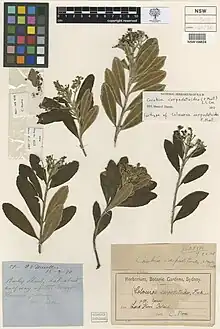| Corokia carpodetoides | |
|---|---|
 | |
| Scientific classification | |
| Kingdom: | Plantae |
| Clade: | Tracheophytes |
| Clade: | Angiosperms |
| Clade: | Eudicots |
| Clade: | Asterids |
| Order: | Asterales |
| Family: | Argophyllaceae |
| Genus: | Corokia |
| Species: | C. carpodetoides |
| Binomial name | |
| Corokia carpodetoides | |
| Synonyms[2] | |
| |
Corokia carpodetoides, simply known locally as corokia, is a flowering plant in the Argophyllaceae family. The specific epithet derives from a resemblance to the genus Carpodetus, with the addition of the Latin suffix -oides (“resembling”).[3][4]
Description
It is a shrub, usually growing to about 2 m in height, but occasionally up to a tree-like 5 m. The young stems have a covering of short, matted hairs. Its narrowly oblanceolate to narrowly elliptic leaves, 2–6 cm long and 1–2 cm wide, are crowded towards the ends of the branches. The terminal, corymbose inflorescences bear many small yellow flowers. The ovoid fruits are single-seeded and about 3 mm long, becoming brown and dry. The main flowering season is December to January.[3][4]
Distribution and habitat
The tree is endemic to Australia’s subtropical Lord Howe Island in the Tasman Sea. It is locally common at higher elevations on Mounts Lidgbird and Gower at the southern end of the island.[3][4]
References
- ↑ "Corokia carpodetoides". Australian Plant Name Index (APNI). Centre for Australian National Biodiversity Research, Australian Government. Retrieved 25 December 2023.
- 1 2 "Corokia carpodetoides (F.Muell.) L.S.Sm". Plants of the World Online. Royal Botanic Gardens, Kew. 2023. Retrieved 25 December 2023.
- 1 2 3 Green, P.S.; Kodela, P.G. (2021). Kodela, P.G. (ed.). "Corokia carpodetoides". Flora of Australia. Australian Biological Resources Study, Department of Climate Change, Energy, the Environment and Water: Canberra. Retrieved 25 December 2023.
- 1 2 3 "PlantNET - FloraOnline". PlantNET (The NSW Plant Information Network System). Royal Botanic Gardens and Domain Trust, Sydney. Retrieved 25 December 2023.